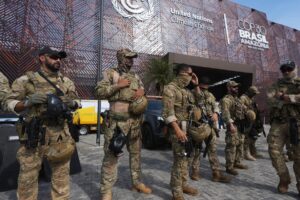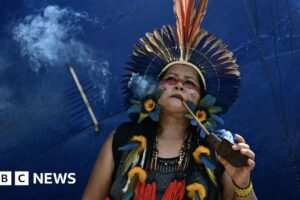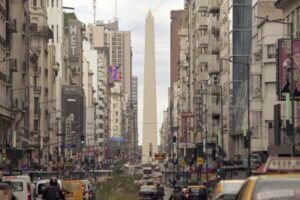
The end of the footballing year is fast approaching and with that we now have a slightly clearer perspective of what 2026 in the Liga Profesional de Fútbol will look like.
It will not include San Martín or Godoy Cruz, who were relegated last weekend, the latter giving up their place in the top flight after 16 years rubbing shoulders with the nation’s elite. We also know that another Mendoza club, Gimnasia, will be taking up one of those vacancies. The Lobo Mendocino will play first-tier football for the first time since the 1984 Nacional competition and also renew their fierce rivalry with Independiente Rivadavia, for whom too 2026 will be a special year as they prepare for their first-ever tilt at the Copa Libertadores.
That leaves just one promotion spot in dispute and another potential piece of history to be made. On Saturday, Deportivo Madryn make the long trip up from Chubut to Córdoba to take on Estudiantes de Río Cuarto in the first leg of the Primer Nacional Reducido final, almost uncharted territory for a club hailing from the wide, frosty expanses of Patagonia.
Should Madryn win through, they will become just the seventh team from the region to have played in the top flight and the first since Argentine football reorganised into the Primera División and Nacional B in 1985. Huracán de Comodoro Rivadavia, Independiente de Trelew, Cipoletti, Atlético Regina, Deportivo Roca and Alianza de Cutral Có all made it under the auspices of the old Nacional, but it has been a long wait for fans way down south since that competition was shelved more than four decades ago.
The reasons for this under-performance are clear. Patagonia is a long way away from Argentina’s primary population centres, meaning endless away trips and huge outlays of cash every time the likes of Madryn hit the road. Even getting to Río Cuarto, far from the longest away day on the club’s fixture list this year, is an 1,100-kilometre slog with two flights up to Córdoba and a three-hour bus ride on the other side; to get up to Jujuy entails a round trip of almost 5,000km, roughly akin to going from London to Moscow and back. It is also by far the nation’s most sparsely populated region and its challenging climatic conditions, isolation from the rest of the country and underfunded clubs do not make it exactly the most enticing option for talented footballers looking to progress their careers.
Still, football always has the potential for surprises. Madryn’s arch-rivals Guillermo Brown came agonisingly close in 2017 but missed out on promotion on the last day. Now the Aurinegro want to go one better after experiencing their own disappointment, losing the Primera Nacional final to Gimnasia for the first promotion spot after finishing first in Group A.
This second chance to go up has not exactly been smooth. In the first round, Madryn beat Gimnasia (Jujuy) 1-0 in Puerto Madryn and made the aforementioned long trek up to San Salvador for the return. During half-time with the game still goalless referee Lucas Comesaña suspended the action while claiming he was threatened by a member of the home delegation (allegations this week dismissed by local prosecutors), with a 3-0 walkover in the away team’s favour the AFA’s eventual decision.
Then, the Aurinegro were left trailing 1-0 to Deportivo Morón and fought back to level the tie at home, going through via the obscure ‘sporting advantage’ rule that benefits the higher-seeded team in the lower leagues. Infuriated at the officiating, Morón’s players staged a pitched battle with police at the final whistle and were gassed for their troubles.
As often in the lower leagues, it is the club’s links with high provincial powers and the AFA which have come into focus: the Sastre brothers, one of whom is Deportivo’s president Ricardo, have controlled the mayoralty of Puerto Madryn since 2011, while Ricardo is currently vice-governor of Chubut Province. He did not exactly help his case with a curious assertion some months before this current storm broke, where he said “it is obviously easier for us with [AFA chief Claudio ‘Chiqui’] Tapia and [AFA treasurer Pablo] Toviggino, we have a lot of input – not just in getting acknowledged as an institution, but in representation for AFA assemblies.”
We can only wait to see what unfolds this Saturday and in the following second leg against an Estudiantes team which has also fielded accusations of cosiness with the powers-that-be in recent years – in a famous episode back in 2019 the VP of a rival club chained himself to AFA’s headquarters in protest at what he saw as the side’s unfair promotion up to the Nacional B. As ever it is a shame to be even talking about such matters on the eve of such an intriguing match and it is the product of Tapia’s own murky running of the AFA that invites allegations on a constant basis as well as the general atmosphere of paranoia that feeds off such an opaque administration.
But if Madryn can rise above the mess and finish off this memorable season with a flourish, they have a great chance of making history for both the club and all of Patagonia.





